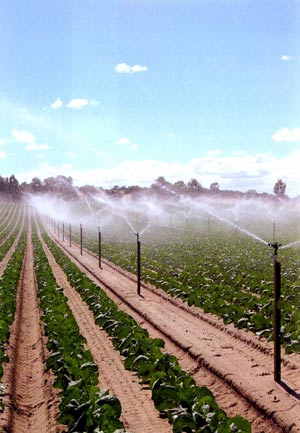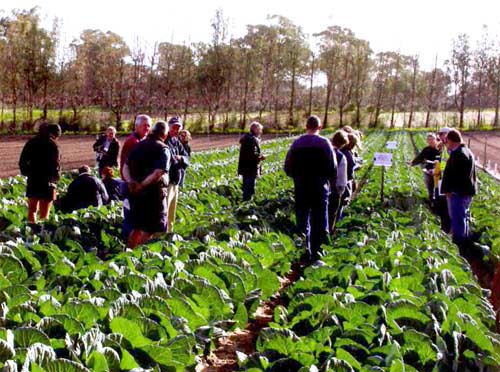|
The infertile coarse sandy soils of the Swan Coastal Plain, which extends 100 km north and south of Perth, are used to produce the majority of Western Australia‟s vegetables.
The year round production of good quality vegetables on these naturally infertile sands with poor water holding capacity and low nutrient retention requires relatively large and frequent irrigation and fertiliser applications.
Achieving the correct balance between crop available water, fertiliser use, crop yield and leaching is essential to the sustainability of vegetable production on the sandy soils of the Swan Coastal Plain.
The unconfined aquifers beneath the region are a major source of commercial and domestic water and efficient water use with minimum loss to the environment is the key to maintaining vegetable production in the region.
Nitrate leached from soils used to grow vegetables is of concern world wide and in most countries vegetable growers are being encouraged to adopt more efficient water and fertiliser practice.
The key to achieving efficient irrigation and fertiliser use is good irrigation design, and the correct scheduling of irrigation and fertiliser.
The value of monitoring soil moisture was universally acknowledged by the participants and the majority of growers adopted evaporation based irrigation scheduling.
Simple monitoring of soil nitrate demonstrated the effectiveness of existing fertiliser practice and promoted the adoption of “3Phase‟ fertiliser schedules which tailor fertiliser application to meet plant variable demand and increase fertiliser use efficiency.
The use of poultry manure was shown to increase soil nitrogen and carbon but result in high levels of nitrate leaching and increased ground water nitrate concentrations.
Authors :
|
Peter O’Malley
|
Rohan Prince
|


Key Findings :
-
Grower attitude toward evaporation based irrigation scheduling and “3Phase‟ fertilising improved and the momentum for uptake of the technologies increased.
-
The equipment, software and techniques developed to monitor plant available water, soil nitrate levels and leaching proved to be reliable and effective.
The system keeps growers informed and enables timely irrigation and fertiliser adjustments to be made throughout the crop.
-
Growers gained greater confidence in the levels of soil nitrate being recommended to achieve good commercial yields of vegetables.
-
The monitoring demonstrated how irrigation, rainfall and fertiliser application interacted to determine plant available nitrate levels in their soil and gave growers the confidence to adjust fertiliser programs.
It also allowed the impact of any changes made to existing practices to be demonstrated in terms of plant available water and nitrogen and reinforced the growers‟ confidence in the program.

Progressive growers are keen to adopt new technologies
and experiment with smarter fertiliser practices
Key Findings (cont) :
-
While growers have been receptive and there has been a notable change in grower attitude toward irrigation and fertiliser scheduling some growers continue with old inefficient practices.
Implementing change without effective drivers has required careful negotiation when dealing with older well established growers and in most cases has proved to be difficult and slow.
-
However, younger progressive growers have been keen to adopt the new technologies and experiment with smarter fertiliser practices.
The close interaction of vegetable grower, project officers and government agencies facilitated by the project has resulted in an appreciation by all parties of the common ground required to meet the needs and commercial pressures of vegetable production and the environmental and social responsibilities of government.
-
The value of monitoring soil moisture has been universally acknowledged by the participants and while the majority of growers acknowledge the value of evaporation based irrigation scheduling precise application at the farm level is often difficult.
-
The value of monitoring soil nitrate to validate and adjust fertiliser practice has been clearly demonstrated and has given farmers the knowledge and confidence to adjust existing fertiliser programs or adopt “3Phase‟ fertilising.
-
The project collected additional information on soil nitrate levels and fertiliser rates required to achieve good commercial crops and benchmark water and fertiliser use in vegetable farming on sandy soil.
SEE ALSO :
VG04015 Benchmarking vegetable water use (2006)
VG04010 Maximising returns from water – Victoria (2007)
Acknowledgements :
This project has been facilitated by the Western Australian State Government and Horticulture Australia Limited (HAL)
in partnership with AUSVEG through the National Vegetable Research and Development Levy.
The Australian Government provides matched funding for all HAL’s R&D activities.
|


